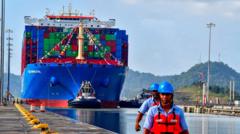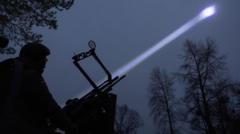President Trump's repeated claims regarding Chinese control over the Panama Canal have drawn sharp responses from both Panamanian and Chinese officials. The Panama Canal is operated by the Panama Canal Authority, and while Chinese companies have significant presence and investments in nearby ports, they do not control the canal itself. This article explores the historical context and current dynamics at play.
Trump’s Claims About Chinese Control Over Panama Canal Spark Diplomatic Tensions

Trump’s Claims About Chinese Control Over Panama Canal Spark Diplomatic Tensions
Analyzing the accuracy of Donald Trump's assertion that China operates the Panama Canal, we uncover the facts behind the claims and the geopolitical implications.
Former President Trump's assertion that China operates the Panama Canal has stirred controversy and sparked diplomatic rebukes from both Panamanian and Chinese officials. During his inaugural address, Trump declared, “China is operating the Panama Canal and we didn't give it to China. We gave it to Panama and we're taking it back.” This statement provoked swift denials from the governments involved, affirming that the canal remains under Panamanian control.
The Panama Canal, a crucial maritime shortcut linking the Atlantic and Pacific Oceans, is a significant route for approximately 14,000 ships annually. Historically, the United States maintained administrative authority over the canal until a treaty signed by President Jimmy Carter in 1977 initiated a transfer of control to Panama, which was fully realized in 1999. Despite Trump’s claims, the Panama Canal Authority, an agency of the Panamanian government, oversees the canal's operations.
This is not the first time Trump has highlighted his stance on the canal. In a Christmas Day social media post, he referenced “wonderful soldiers of China” operating it illegally, a statement that was again rejected by officials in Panama and Beijing. Panamanian President José Raúl Mulino characterized such claims as “nonsense” and reaffirmed there is no Chinese influence on the canal's administration.
Concerns regarding China’s investments in businesses and ports adjacent to the canal are extensive. For instance, since 1997, Hutchison Port Holdings, a Hong Kong-based conglomerate, manages two of the five major adjacent ports—Balboa and Cristóbal. While these operations do not signify governmental control, experts express concern about the potential access to sensitive information regarding maritime traffic, which could be invaluable in geopolitical tensions.
Furthermore, China has invested significantly in Panama's infrastructure and made strides in diplomatic relations since officially recognizing the nation in 2017. Panama’s pivotal geographic position has attracted Chinese interest, culminating in joining China’s Belt and Road Initiative, which aims to bolster global trade networks.
As Trump's claims continue to gain traction, the Panamanian government remains firm in its position, with officials reinforcing their sovereignty over the canal and emphasizing a non-intervention policy. The interplay of investments, operations, and diplomatic ties complicates the narrative, making it essential to distinguish between influence and control in this critical geopolitical landscape.



















